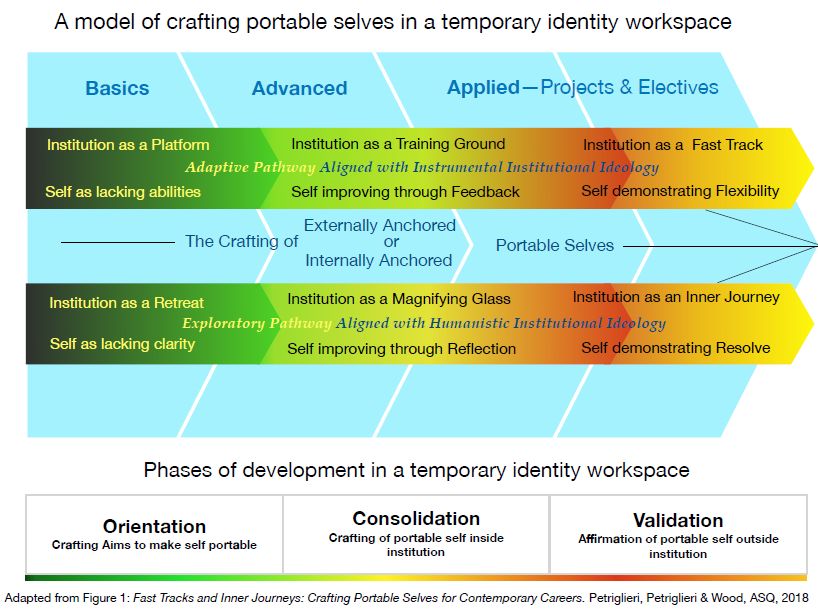
Life invites us to wrestle with two existential questions: “Who am I?” and; “What do I do with my time here on earth?” Both have to do with our identity — how we make sense of ourselves and fit into the world around us. Individual identity is, ironically, a construct of our social systems.
We are products of the systems surrounding us — our families, schools, work. Each system makes different demands, and we respond by occupying different roles and developing different ‘selves’. We don’t usually spend a lot of time thinking about this, we just shift from one facet of our selves to another.
Computers input data, process it, and something comes out — import, process, export. A factory inputs raw materials, the system processes the ore and rough gems, and the output is jewellery. Same with cars, food, and all the artefacts of economic production in contemporary civilization.
But what if the system is for people and not material products? How does that work? We don’t consider ourselves data or unfinished gems — just ‘human resources’ ready to be processed — or do we?
And what if the system is a top-ranked, one-year, full-time MBA program? And the imports are not data or raw materials, but mobile young managers with years of international experience? What happens in that system? With our colleague Jennifer Petriglieri from INSEAD, we decided to look — recording and analysing three sets of in-depth interviews with 55 students of a one-year MBA programme we’ll call “Blue”.
The ‘Blue’ MBA programme
Three weeks into Module 1, we knew something was up. Instead of the universally happy smiles pictured in slick MBA brochures, the students were having a difficult time. Tension was everywhere — in their study groups, in their marriages, and in themselves. Anxiety, aggression, confusion, curiosity, defensiveness, determination, passion, and tears — all the things corporations consider vaguely unprofessional and avoid seeing — kept hitting us in the face.
Blue marketed itself as a place where students would greatly increase their opportunities. This proposition entailed two distinct institutional ideologies (systems of beliefs and values) — instrumental and humanistic — that served as organizing principles. Both found their way into the school’s brochures, marketing speeches, and media reports.
Blue’s pitch resonated with prospective students, whose work experience had left them eager to pursue what turned out to be two parallel aims: achievement — I can become someone (a general manager, CEO, board chairman, etc.) — and discovery — I can clarify who I am and where I want to be. Although pitched as complementary, reconciling these parallel aims and ideologies was practically impossible. Institutional tension was built in: students were expected to perform well but also encouraged to reflect on the meaning of their own behaviour. Integrating these two aims was like attempting to force two parallel lines together — it only happens in infinity.
The orientation phase
Before arriving, students had an established idea of who they were, but the three-month basics module was markedly disorienting. Whereas the overt academic task at Blue was typical of any MBA program and one that students easily grasped — performing well in lectures, quizzes, papers, and presentations — the task posed by the ‘leadership stream’ unsettled the cohort. ‘Thinking psychologically’ — making sense of one’s own and others’ conscious and unconscious behaviour, thoughts and feelings — descended on the class like a giant Harry Potter ‘Sorting Hat’. The ‘system dynamics’ were glaring: the class split.
Student anxiety had heightened with the incongruity between their own achievement and discovery aims, but the dual institutional ideologies helped by providing two legitimate spaces where the incongruity — and the class — could be sorted and supported.
The consolidation phase
We humans seem to need the ‘other’ to know who we are, and the MBA social structure manifested a universal in-group/out-group splitting phenomenon. This polarization was inevitable—and ironically necessary. Because Blue honoured both ideologies, identification with one of the two major groups reduced individual anxiety and provided security and psychological protection. As individuals decided to affirm one or the other ideology, anxiety diminished and coalesced along two distinctive pathways.
The adaptive pathway
The adaptive pathway was linear. Students on that pathway saw their achievement aims in Blue’s instrumental focus on performance — the acquisition of skills leading to professional competence. They experienced Blue as a’ training ground’ where they could polish themselves through improvement; a safe place to experiment, get feedback, learn the ropes, become flexible, and tailor themselves to fit the challenges of any future career.
The exploratory pathway
The exploratory pathway was non-linear. Inherently more obscure, exploration felt less a trajectory than a meandering. Students on that pathway saw their personal discovery aims in the leadership stream’s humanistic focus on finding meaning through reflection. They experienced Blue as a ‘magnifying glass’ that helped clarify who they were; a safe place to gain authentic self-awareness and discover domains that would fit them following graduation.
Portable selves
Those whose evolving identity narratives progressed along the two pathways were gazing over the same territory but hiking upon different landscapes. Those on the adaptive pathway had developed externally anchored portable selves—identities tied to broad social categories like, ‘becoming a global leader’. Those on the exploratory pathway were developing internally anchored portable selves — identities expressing personal authenticity and integrity.
Two sorts of ‘portable selves’—relatively secure identities for confronting the stresses of contemporary mobile careers—emerged and consolidated. Those few individuals unable to identify with either the instrumental or humanistic ideology were left weathering disconnected feelings of anxiety and loneliness.
Figure 1. A model of crafting portable selves in a temporary identity workspace

The validation phase
The validation phase came near the program’s end and gave rise to a secure sense of ‘self-efficacy’ or ‘agency’— the belief they’d have personal control as life unfolded. The successful crafting and external re-affirmation of their portable selves left students grateful for their year at Blue — as a launching platform for those with an externally anchored belief that they could adapt to circumstances, or as a reflective retreat for those with an internally anchored belief that they were discovering settings in which to flourish and express themselves. The friction between the two groups diminished, as each considered the other with something like the bemused tolerance one holds for a benign yet somewhat eccentric relative.
It’s impossible to convey in this short essay the touching emotional experience of the sensitive and courageous young students who worked so hard to make sense of the turmoil experienced in their MBA year. The ‘heart’ of our research can be found in the poignant interview quotations in the original paper findings. We encourage you to read them and contemplate their significance. The dilemmas they faced may feel familiar. The quotes cast a light on the experience of people in mobile careers, and suggest that schools and organizations that claim to keep the new world of work humane, can’t simply place people in jobs, but must support identity work that can endure, even after they have moved on.
♣♣♣
Notes:
- This blog post is based on the author’s paper Fast Tracks and Inner Journeys: Crafting Portable Selves for Contemporary Careers, Administrative Science Quarterly, Vol 63, Issue 3, 2018
- The post gives the views of its authors, not the position of LSE Business Review or the London School of Economics.
- Featured image credit: Photo by Startup Stock Photos on Pexels
- When you leave a comment, you’re agreeing to our Comment Policy.
 Jack Denfeld Wood is professor of management practice at the China Europe International Business School (CEIBS), professor emeritus of leadership at IMD, and is a visiting professor at the Moscow School of Management (Skolkovo) in Russia. His academic publications and areas of special interest include leadership development and the role of unconscious processes in leadership, followership, group dynamics, and ideology.
Jack Denfeld Wood is professor of management practice at the China Europe International Business School (CEIBS), professor emeritus of leadership at IMD, and is a visiting professor at the Moscow School of Management (Skolkovo) in Russia. His academic publications and areas of special interest include leadership development and the role of unconscious processes in leadership, followership, group dynamics, and ideology.
 Gianpiero Petriglieri is associate professor of organisational behaviour at INSEAD. Gianpiero has chaired the World Economic Forum’s Global Agenda Council on new models of leadership and was recently named one of the 50 most influential management thinkers in the world by Thinkers50.
Gianpiero Petriglieri is associate professor of organisational behaviour at INSEAD. Gianpiero has chaired the World Economic Forum’s Global Agenda Council on new models of leadership and was recently named one of the 50 most influential management thinkers in the world by Thinkers50.





